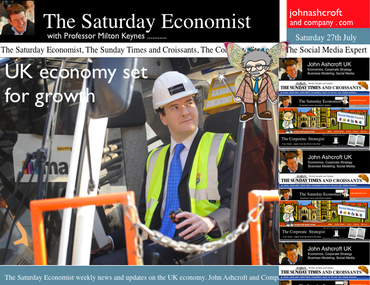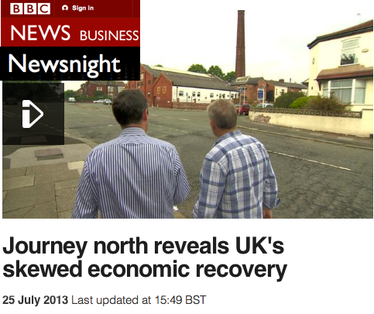 Economics news – UK economy on track for growth this year. Another week of excitement for economists. The first estimate of GDP for the second quarter was released on Wednesday. The good news - the UK Economy is on track for growth of 1% this year, GDP statistics confirm the economy is recovering. According to the official ONS figures, the economy grew by 0.6% in the second quarter compared to the first quarter of the year. Confirmation of trends reflected in the Greater Manchester Chamber of Commerce Quarterly Economic Survey last month. The largest contribution to growth came from the service sector but there was also a positive contribution in the quarter from manufacturing and construction. Comparisons with last year are distorted by the extra holiday provided by the Queen’s Jubilee. On an adjusted basis the economy probably grew year on year by around 0.7%. What does this mean for the rest of the year? We believe the recovery will continue albeit at a steady state. For the year as a whole we anticipate growth around 1%. Growth will continue to be driven by the service sector, with still lots of work required in manufacturing and construction to herald a return to growth across the board. George Osborne, the chancellor, said: “Britain is holding its nerve, we are sticking to our plan and the British economy is on the mend” Excellent. Good news for the manufacturing in the North West this week. The announcement of the new Bentley SUV to be built at Crewe with an investment of £800 million. Juergen Maier - MD of Siemens - champion of the manufacturing sector, will be pleased and quite right to. In other news ... Not so great for the North West, this week, Newsnight was in Eccles on Wednesday. There is something very worrying about Newsnight - Paul Mason and economics. Paul Mason’s grasp of economics is tenuous enough. When he dumbs down his limited comprehension to a late night audience, the facile output should not be allowed to cross the Blue Peter watershed. This week Mason visited Eccles, to investigate the economic recovery and how it is affecting job growth in the North West. Eccles, why choose Eccles? Well, we learned, there are 77 outlets selling alcohol within one kilometer along the high street. It is a shocking example of how the North is falling behind in recovery! Is it really? No it’s not, it’s an example of what happens to a high street, when the Trafford Centre, two retail parks, a Costco, B&Q, Asda and Marks and Spencer open up within a ten minute drive time. Newsnight could have gone to the Trafford Centre or to Media City UK, ten minutes by tram, in the other direction. All great examples of progressive infrastructure investment and economic growth in the North. No Paul had to have his fish and chips in Eccles. The BBC claims the journey North, revealed UK’s skewed economic recovery. It doesn’t, it reveals the skewed economics thinking on Newsnight. The problems exposed in the world of Paul Mason’s economics are not “structural” problems, they represent myopic, misleading perceptions of economic reality which do nothing for the reputation and image of Manchester and the North West. They don’t do much for the reputation of Newsnight either. Paul Mason is one of us, born in Leigh, educated in Bolton with a degree in music. Paul trained as a music teacher in Loughborough. Challenged, Paul claimed “it was journalism” not a “dumb neoliberal marketing plug for Manchester.” Well it certainly wasn’t a plug for Manchester, it may have been journalism but it wasn’t economics. Check out the article here and the link to the Newsnight piece. Let us know what you think! What happened to sterling? Sterling rallied further this week closing at $1.5384 from $1.5258 against the dollar but down against the euro to 1.1581 from 1.1608. The Euro dollar closed down at 1.3275 from 1.3411 and against the Yen, the dollar also closed down 98.2 from 100.3. Oil Price Brent Crude closed down slightly at $107.2. The average price in July 2012 was $103 approximately. Markets, were up - The Dow closed up 15,558 from 15,543. The FTSE closed at 6,554 from 6,630. Markets continue to rally. This is the time to average in, albeit slowly into August. Appetite for IPOs and new issues is improving. The backlog from the recession will assist activity over the next eighteen months. UK Ten year gilt yields closed at 2.34 from 2.29, US Treasury yields closed down at 2.56 from 2.48. Yields are set to move higher, albeit against the wishes of the central banks. Gold closed up at $1,325 from $1,292. Bernanke may not understand gold? Bull or bear, that’s what makes a market. We cannot always understand it. That’s all for this week, don’t miss The Sunday Times and Croissants out tomorrow. Check out The Saturday Economist web site, and the new Chart of the Day Page. That’s all for this week, don’t miss The Sunday Times and Croissants out tomorrow. The Saturday Economist.com is mobile friendly, no need for a special app any more! Join the mailing list for The Saturday Economist or forward to a friend to let them share the fun! John The material is based upon information which we consider to be reliable but we do not represent that it is accurate or complete and it should not be relied upon as such. We accept no liability for errors, or omissions of opinion or fact. In particular, no reliance should be placed on the comments on trends in financial markets. The receipt of this email should not be construed as the giving of investment advice. It's just for fun, what's not to like! Dr John Ashcroft is The Saturday Economist.
0 Comments
 There is something very worrying about Newsnight - Paul Mason and economics. This week Mason visited Eccles, to investigate the economic recovery and how it is affecting job growth in the North West. Eccles, why choose Eccles? Well, we learned, there are 77 outlets selling alcohol within one kilometer along the high street. Do the maths, that’s one every 12 metres. Pawn shops and betting shops can be used to break up the pub crawl and provide additional funding en route. So what can we do to restore the Eccles high street to it’s former glory, asks the man born in Leigh, educated in Bolton and with a degree in music from Sheffield? It will take ten years, real jobs and training in skills to begin to restore the balance says Alec McFadden, from the Salford Unemployed Community Centre. There is no quick fix! Quite right Alec. Alec has been engaged with this problem for some time now. Eccles is what we call in economics “ a structural problem” says the itinerant BBC presenter. No it’s not, it is representation of social deprivation in a specific area of the Greater Manchester. It is also an example of what can happen to a high street, when the Trafford Centre, two retail parks, a Costco, B & Q, Asda and Marks and Spencer open up within a ten minute drive time. Newsnight could have made a visit to Media City, a great example of job creation and infrastructure investment into the new dynamic growth areas of digital and creative media. After all, it’s only ten minutes away by tram, a great example of infrastructure investment in Greater Manchester, part of the Transport for Greater Manchester Plan. Whilst there, he could have visited the Salford University New Media Campus, after all Manchester has one of the largest university student populations in Europe. He could have arrived by plane, reminding viewers we have just bought Stansted. Had he done so, he would have passed the Airport Enterprise Zone en route within sight of the new Medi Park, both on track to create a substantial number of new jobs over the next five years within Greater Manchester. No, Newsnight had to go to Eccles. It had been a long day. Paul had taken breakfast in a pop up breakfast bar in Soho, it doubles as a bar in the evening. “It’s what we call in economics using spare capacity” says the man who once trained to be a music teacher. No it’s not. It’s a pop up shop using space capacity, not quite the same thing as doubling up shifts on a car production line to meet demand in a growing economy. For lunch, Paul was in the Midlands to visit BSA Machine Tools. Now with 35 workers, Paul wanted to understand the constraints to growth. BSA Cycles Ltd and BSA Guns Ltd also in Birmingham, once controlled 67 factories, employed 28,000 people and contained 25,000 machine tools. The now much smaller BSA Machine tools was struggling to expand again because of a lack of skilled labour and and access to finance. Shocking, the problem - labour skills and those banks again. Mason claimed “It was said the recovery would be led by industry and exports to rebalance the economy”. Not really Paul, The march of the makers rebuilding the workshop of the world was always a Whitehall dream. Most economists never really believed that anyway. Will the problems of capacity constraints in Birmingham and Eccles lead to low growth in the UK economy as a whole? He asked. Of course not. Job creation continues at pace in the private sector. The problems exposed in the world of Paul Mason’s economics are not “structural” problems, they represent myopic, misleading perceptions of economic reality which do nothing for the reputation and image of Manchester and the North West. They don’t do much for the reputation of Newsnight either The closing shot featured Paul Mason having “tea” in Eccles, fish and chips on the high street. The people of Eccles looked on. They have no jobs, well let them eat Eccles cakes, the obvious solution. The journey north did not reveal the UK's skewed economic recovery, more the skewed thinking on Newsnight. Miss the show, watch it here and let us have your views |
The Saturday EconomistAuthorJohn Ashcroft publishes the Saturday Economist. Join the mailing list for updates on the UK and World Economy. Archives
July 2024
Categories
All
|
| The Saturday Economist |
The material is based upon information which we consider to be reliable but we do not represent that it is accurate or complete and it should not be relied upon as such. We accept no liability for errors, or omissions of opinion or fact. In particular, no reliance should be placed on the comments on trends in financial markets. The presentation should not be construed as the giving of investment advice.
|
The Saturday Economist, weekly updates on the UK economy.
Sign Up Now! Stay Up To Date! | Privacy Policy | Terms and Conditions | |
 RSS Feed
RSS Feed